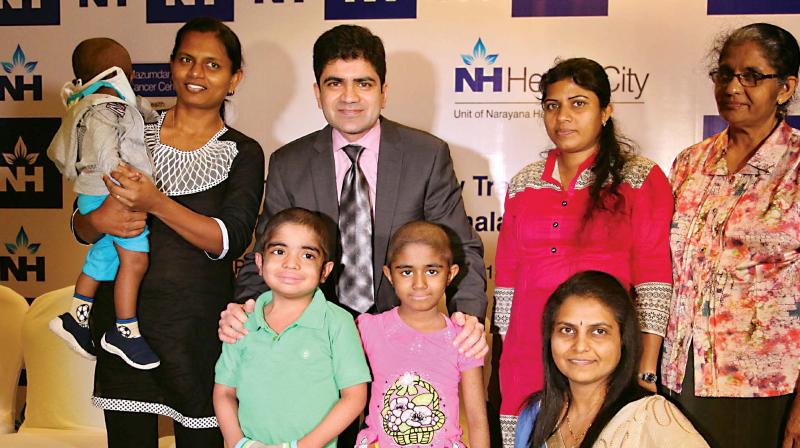Saving neighbours, Bengaluru hospital helps 4 Sri Lankan kids
Fortunately, the team could find matching donors for all the four children.

Bengaluru: Jayantha Balasooriya from Sri Lanka, the father of four-year-old girl Suwini Umeda Shreemali Balasooriya, is a happy man. “Back home, thalassemia major is considered an incurable disease, especially for children who do not have related donors. The children depend on blood transfusion and succumb very early in life. Thankfully, we heard about the bone marrow transplant unit at Narayana Health City, and we are grateful to Dr Sunil Bhat and the entire team for not only curing my daughter, but also the children of my friends of this dreadful disease.”
Mr Balasooriya, who is also the secretary of The Thalassemia Society, emphasised the need for a donor registry in Sri Lanka and having such expertise in their country to help more patients.
Suwini and three other patients came to the city to get treated for the life-threatening disease. The patients included 15-month-old girl Nethumi Shenaya Rajapaksha Bomaluwe, five-year-old boy Purna and 10-year-old Mithun Dilesh Welgamage. They have all been treated through unrelated donor bone marrow transplant. The doctors sourced matching bone marrow cells from unrelated donors from across the world and carried out the transplants at the Bone Marrow Transplant Unit of the Mazumdar Shaw Cancer Centre, Narayana Health City.
Elaborating on the treatment, Dr Sunil Bhat, Senior Consultant and Head of Paediatric Haematology, Oncology and Bone Marrow Transplant at Narayana Health City, said, “Apart from finding human leukocyte antigen (HLA)-matched donors for all the four children, the biggest challenge was to ensure acceptance of the stem cells by the recipients’ system. In unrelated bone marrow transplant, unlike in related donors, the genetic makeup and immune systems in the recipient and the donor are very different. Hence, the chances for complications both during and post-transplant are very high. Fortunately, in the case of these children, their body responded very positively to the transplant and that has helped us to cure them of thalassemia major.”
He pointed out that chances of finding matched donors are far better from the same ethnic background. As there are no unrelated donor registries in Sri Lanka, finding a donor for them was a challenge, he said.
For the hospital, it was a challenge to meet, as all previous attempts elsewhere to find matching bone marrow donors in the families of these children had failed. Fortunately, the team could find matching donors for all the four children. While Suwini and Purna found saviours in Datri Registry (India), the other two found matching donors from German Registry (DKMS) in London.

